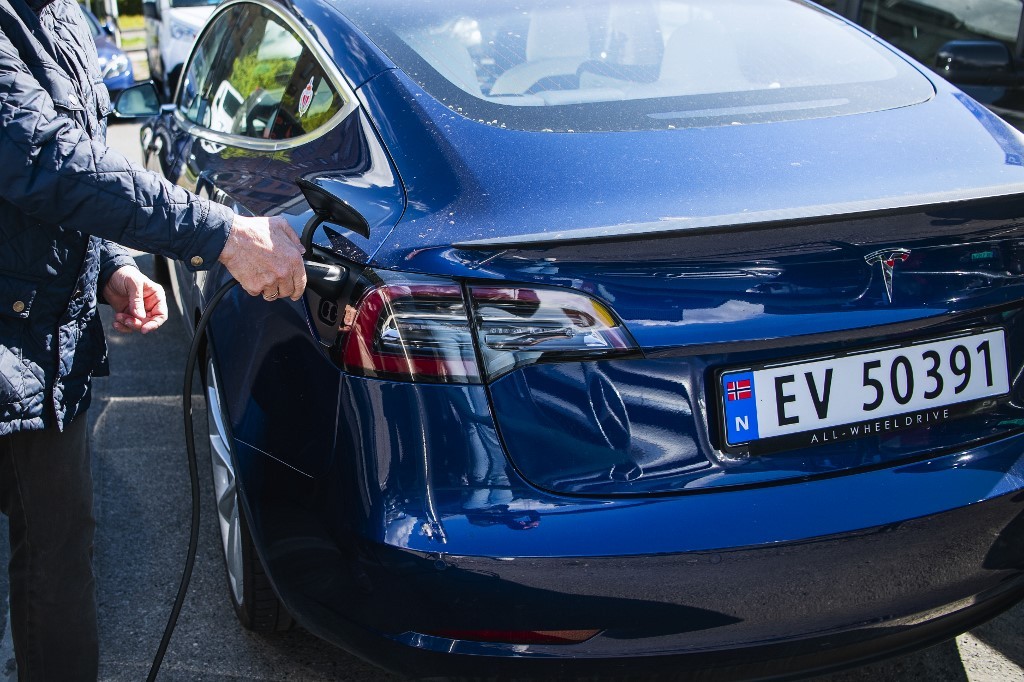Popular Reads
Top Results
Can't find what you're looking for?
View all search resultsPopular Reads
Top Results
Can't find what you're looking for?
View all search resultsNew US electric car chargers are a green leap of faith
With more electrical models set to hit showrooms, the focus will shift to consumers' willingness to pivot to electric cars at a time when conventional gas stations remain familiar and ubiquitous.
Change text size
Gift Premium Articles
to Anyone
I
t has been a long road for electric cars in the United States, but myriad announcements by major automakers signal they are at last moving towards the mainstream.
With more electrical models set to hit showrooms, the focus will shift to consumers' willingness to pivot to electric cars at a time when conventional gas stations remain familiar and ubiquitous.
The fear of being stranded has long been viewed as a barrier for electric vehicles (EV). Addressing this unease, dubbed "range anxiety," is driving President Joe Biden's policy and bringing new EV charging companies to public markets.
In New Jersey, a northeastern state with an autocentric orientation typical of the United States, officials recently announced $5.4 million in grants to build EV chargers at 27 high-traffic locations, including at 7-Eleven convenience stores, gas stations and outdoor strip malls.
The new chargers, which will allow motorists to fuel up in 20 to 30 minutes, aim to normalize EVs, counter range anxiety and create a path to a petroleum-free future.
But the push highlights a quirk in the future of EVs: It is not clear exactly how much these new stations will be used, because most charging is still expected to take place at home or at work.
"The public charging is really to fill up here and there," said Peg Hanna, an assistant director at the New Jersey Department of Environmental Protection.
Ben Rich, who charges his Tesla at home but uses fast chargers when traveling, suspects some of the sites will be underutilized, but thinks they are probably needed to transition off of fossil fuels.
"People need to feel they will be able to charge if they need to," said Rich, who teaches physics and environmental science in Montclair, New Jersey. "If they don't feel this, they will stick with gasoline cars."
Momentum for EVs was rising even before the 2020 election, but since November, General Motors has set a 2035 target for having an all-electric fleet, and states have accelerated EV programs.
Biden pledged to build 500,000 new EV charging stations during the campaign and included funding for new chargers in his proposed $2 trillion infrastructure package.
The plan faces opposition from Republicans, yet White House support for EVs has added to confidence that change is coming.
"It's no longer a question of 'if' and not even a question of 'when.' It's now," said Jonathan Levy, chief commercial officer at EVgo. "The question is how much faster does it go?"
EVgo, which plans to go public later this year, is a leader in fast chargers, which run at many times the voltage compared with "Level 2" chargers that recharge cars over several hours.
The burst of electricity needed can sometimes require additional transformers. Local permitting and siting requirements can also drag out projects, industry officials say.
Underlying the broader EV question is the need for consumers to accept new fueling technology.
A fast charger at a mall enables a consumer to charge while they pick up groceries or eat lunch. Another option is to power up at home or at the office.
Powering up at a public EV station typically costs well under $10, much less than filling up on gasoline. Electric car owners report modest increases in power bills from charging at home, although purchasing and installing a home charger can amount to an up front investment of several hundred dollars.
With either option, electric fueling is a change from the current model, where drivers of fossil fuel-burning vehicles pull up and pump gas for a few minutes.
Pasquale Romano, chief executive of ChargePoint, which went public earlier this year, thinks consumers will embrace the shift, comparing powering a car at home to charging a smartphone.
Fueling up with gasoline "is very antiquated" and "anchored in the liquid fuel world," Romano said.
Many of the public chargers now out on the market see little use.
An EVgo charger at a strip mall in the New York suburb of Selden had fewer than two charges per day in March, according to Daren Moss, senior vice president of operations and sustainability at Brixmor Property Group.
But Moss expects "exponential" demand growth in the coming years as more EV models arrive. Brixmor is planning 20 to 40 more charging sites at its strip malls in 2021.
"Providing this amenity helps bring customers to the property," Moss said.
Jesse Georgaklis also believes an EV transition is coming, even as the EV charger at his BP gas station in Brick, New Jersey sits mostly idle.
"I think it's going to creep up on us faster than we think," he said.
Georgaklis expressed ambivalence about EVs, recognizing the importance of preserving the environment for his son's generation, but trepidation for the future of his business, which was started by his grandfather in 1947.
"Where are we going to make up for the economy for the gasoline business?" he asked. "From the guy who ships it over to my guy here who puts it in tanks, there's a lot of people with a lot of jobs and a lot of money that's at risk."










